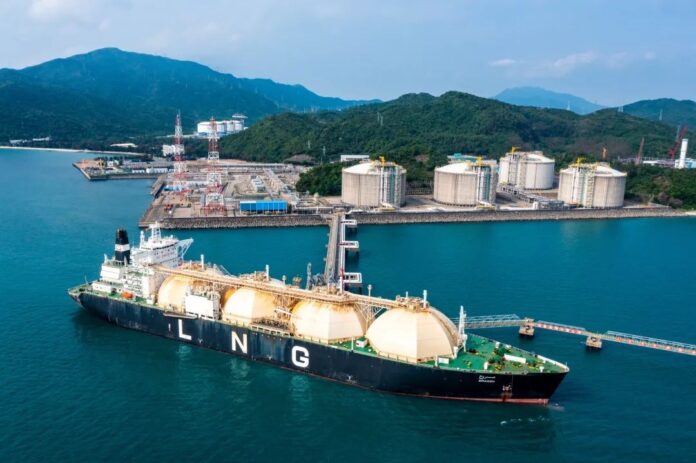ISLAMABAD:Federal Minister for Petroleum, Ali Pervaiz Malik, on Thursday indicated that the government is considering revising its long-term LNG agreement with Qatar, citing its adverse impact on the country’s gas supply situation and financial sustainability.
While talking to media, petroleum minister Ali Pervaiz Malik told media here on Thursday that second contract of Liquefied Natural Gas (LNG), with Qatar had resulted in gas issues. He acknowledged that Pakistan is currently facing a surplus of imported Liquefied Natural Gas (LNG), largely due to its second contract with Qatar.
“If there had not been such an LNG contract, we might not be facing the current situation of default in the gas sector,” he said, adding that government would take the decision of revising LNG deal with Qatar which is due in 2026, keeping in view the country’s interest.
There is an issue of demand and supply in the country regarding LNG,” he said adding that 300 mmcfd gas supply has been curtailed due to LNG.
“The RLNG has created significant distortions, compelling us to manage supply by cutting cheaper local production,” he said.
Ali Pervaiz Malik stressed the need for unified policy-making in the energy sector. “There should be one Energy Ministry. The Petroleum Division must be taken on board in all major decisions regarding the energy sector,” he asserted.
This agreement, initially envisioned to bolster energy security, has instead led to an expensive surplus of LNG within the country. The current government is now actively working to balance the nation’s energy demand and supply.
Minister said that expensive RLNG compelled the government to suspend indigenous 300 mmcfd gas production and trying to manage the supply and demand side.
On the recent increase in fixed gas charges for protected consumers, the minister explained that the government had to recover part of the Rs 150 billion subsidy being extended to domestic consumers. He also mentioned the diversion of Rs 250 billion worth of RLNG from the power sector to the domestic sector. He said Rs 150 billion subsidy to protected gas consumers in addition to Rs 250 billion RLNG diversion from power to domestic consumers compelled the government to increase the fix charges by Rs 200, added that the system gas was still cheaper than the LPG.
“We are in an IMF program which demands zero deficit,” he noted, defending the increase of Rs 200 in fixed charges.
Touching on international investment, the minister said that Pakistan has extended equal opportunities to companies from China, Russia, and the United States in its mining sector. “There is no discrimination. Any company from these countries can bid when we float tenders,” he clarified, citing his recent visit to Russia where he invited firms to invest in Pakistan’s mineral resources.
On the Iran-Pakistan (IP) gas pipeline project, the minister informed that the two countries are currently in arbitration in Paris and a ministerial committee is reviewing the situation, particularly in light of regional tensions between Iran and the US.
About Refineries upgradation, he said that demand of refineries were justified and added that tax had been exempted on output and their margin had been regulated. “This is against basic principle,” he said adding that undue burden should not be put on the refineries if government wants them to invest $5-$6 billion in upgradation projects. He said that zero rating matter was taken up with the IMF which said that ‘zero rate’ will not work.
The government had exempted sales tax in budget 2024-25 which had resulted in loss of Rs 34 billion for refineries and IMF. The government had also committed to impose sales tax up to 5 percent in budget 2025-26 but government had continued zero rating which had irked the refineries, putting $6 billion planned investment in refining sector.
“I have tried my best to resolve issues of refineries and finance minister had agreed to resolve it,” minister added.
Regarding oil and exploration sector, he criticized that exploration companies have faced 40 percent corporate tax which was very high and would hurt indigenization efforts of the government to explore oil and gas. “This is against our indigenization drive,” he warned.




